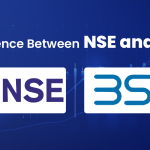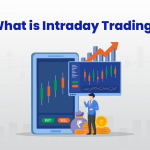India boasts two leading stock exchanges. These correspond to the Bombay Stock Exchange (BSE) and the National Stock Exchange (NSE). For the Indian stock market, both are pretty vital. Though they seem a lot alike, they are not. Their history, working style, and market worth differ in many ways. This blog will review NSE and BSE, their differences, and why purchasers should know about both marketplaces.
What is NSE?
More deals than any other stock market in India, the National Stock Exchange (NSE) manages. Having barely entered the scene in 1992, it is a recent participant compared to the BSE. India’s NSE enabled online trading. It revolutionized how trade is done and replaced the traditional floor-based approach. Among their most well-known indexes is the Nifty 50. It follows the top 50 corporations in numerous different sectors of the market.
Providing buyers with rapid, simple, easily reachable trading options is the primary objective of the N SE. Over the years, its strong technical base—which allows rapid and straightforward transfers—has become increasingly important. Significant institutional purchasers and high-frequency traders have benefited from it.
What is BSE?
Established in 1875, the Bombay Stock Exchange (BSE) is the oldest in Asia. Mumbai is where it is situated, and Indian business has a long history with it. The BSE offers several financial services: stocks, options, futures, commodities, and mutual funds. Its leading indicator, the Sensex, monitors thirty of the largest and most traded equities available.
The BSE is older and has a more extended history but has changed over time. It is switching to electronic trade methods to stay relevant in today’s fast-paced market. Many people know the BSE for helping smaller businesses by giving them a place to trade shares and earn money.
Critical Differences Between NSE and BSE
Even though both NSE and BSE are well-known stock markets, they are not the same in many ways, such as:
Establishment and Legacy:
- NSE has been around since 1992 and is known for the modern way it trades.
- As the oldest market in Asia, BSE has a long history. It has been open since 1875.
Market Capitalization and Indices:
- The 50 large-cap companies that make up the Nifty 50 index are the NSE’s most important asset. It gives you a big picture of how the market is changing.
- A good indicator of the Indian economy is the BSE’s Sensex, which tracks 30 well-known companies.
Trading Volumes and Liquidity:
- Most of the time, the NSE has more trade activity and better liquidity. This makes it the market that big institutions and high-frequency trades use the most.
- BSE sees fewer trades, which may mean that there is a little less activity. However, it is still a good place for small businesses and standard investors.
Technology and Trading Infrastructure:
- Some of the best traders in the world like NSE because it has cutting-edge technology and quick exchange times.
- Modernizing BSE might not match NSE’s speed and technology infrastructure. Even though it is still safe and valuable for regular buyers.
Why Does This Matter for Investors?
Knowing the differences between NSE and BSE is essential to make intelligent business choices. Investors often pick one over the other based on their trading tastes, such as the types of companies mentioned, how liquid the market is, or how advanced the technology is. For example, day traders or high-frequency traders may like NSE better because it is more open and transactions happen faster. Long-term buyers or people who like smaller companies may lean toward BSE, on the other hand.
The Nifty 50 and Sensex measures of these sites also show how healthy the market is. Investors often watch these to decide whether to enter or leave a market.
Conclusion
India’s two biggest stock markets, NSE and BSE, may look alike, but they are different in ways that make them applicable to different buyers. Both markets have their benefits, whether you’re looking for high liquidity, cutting-edge technology, or a more comprehensive offering for small companies. Maitra Wealth can help you find your way around the Indian stock market and make intelligent investment choices if you’re considering investing there but don’t know how to pick the right platform. Get in touch with us right away to begin your path to financial freedom!










